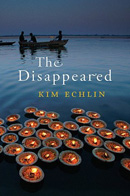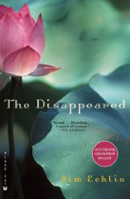


Hamish Hamilton, hardcover, 9780670069088
Black Cat, paperback, 9780802170668
The Disappeared, one of the five books shortlisted for the 2009 Giller Prize, is a novel about inexplicable loss and obsessive love. In this novel Anne Greves reflects on her lifelong love for Serey, a love that takes her from her sheltered life in Montreal to war-ravaged Cambodia. "I remember fragments, bits of moving light on a winter wall," she says, meditating on the ethereal moments of their relationship. Kim Echlin writes in declarative sentences and uses clear, simple prose, which gives the novel a highly personal, somewhat raw feeling. In an approach that gives the novel a sense of vivid intimacy, Anne tells her story by speaking directly to her lost love: "I can still see a particle of dust hanging in a sunbeam near your cheek as you sleep."
Anne and Serey meet in a Montreal jazz club. She is sixteen, and has snuck in with older friends; he is twenty-one, a musician and math tutor. It is the Vietnam War era, and Serey cannot return to his home in Cambodia because the country's borders are closed. She is attracted to this exotic, motorcycle‒riding young man, and the "gloom and glory" of his exile; he enjoys the "shock of the Asian guy and the white girl." Against her father's objections, they carry on a torrid romance, which ends abruptly after six months when the Cambodian borders open and Serey returns to find his family.
Anne goes through the motions of getting on with her life, but her love for Serey becomes her obsession. After a decade of silence, she travels to Cambodia to search for him. Three‒quarters of the novel takes place in Cambodia, where everyone Anne meets has suffered unspeakable horrors under the Pol Pot regime and in its aftermath. She eventually finds Serey and they rekindle their love affair. As in many passionate literary romances, external forces doom their love. Even though Anne's narrative is a rumination on her past, her emotions have not mellowed over time. "I learned that those we love can disappear suddenly, inexplicably," she says, "And then there is nothing." Outside of her relationship with Serey, she has chosen to simply exist "I have filled in time . . . a lifetime of silent pretending."
The ill‒fated affair, however, becomes just a frame on which to form the real story—that of the
atrocities inflicted upon the Cambodian people. Together and individually, Anne and Serey weave through the
chaos of Phnom Penh in search of answers and lost information with the goal to prevent the victors from
rewriting history at the expense of the vanquished.